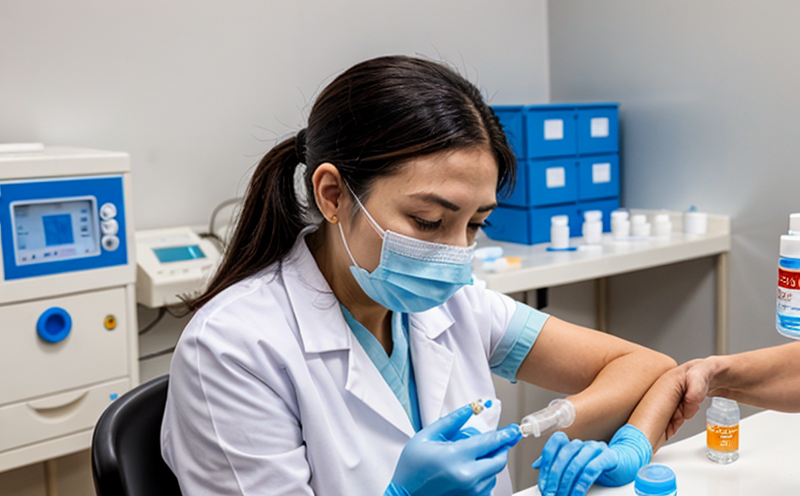WHO Stability Testing of Vaccines
The World Health Organization (WHO) stability testing is a critical phase in vaccine development and manufacturing that ensures the safety, efficacy, and quality of vaccines. This process involves rigorous evaluation to determine the shelf life and stability parameters under various environmental conditions. The objective is to ensure that the vaccine maintains its potency and integrity throughout its storage and distribution lifecycle.
Stability testing is mandatory for all vaccines before they can be approved by regulatory agencies such as the WHO, the European Medicines Agency (EMA), or the US Food and Drug Administration (FDA). Compliance with WHO standards is crucial for manufacturers aiming to distribute their products globally. This service ensures that vaccines meet the stringent quality requirements set forth by international bodies.
During stability testing, samples are stored under accelerated conditions to simulate real-world storage scenarios over an extended period. These conditions include temperature extremes, humidity variations, and light exposure. The aim is to assess how the vaccine behaves under these stressors without compromising its efficacy or safety.
The primary parameters measured during WHO stability testing include:
- Pharmacodynamic changes
- Physical stability
- Chemical stability
- Biological activity
- Potency and purity
The test results are used to determine the shelf life of the vaccine, which is then communicated to regulatory bodies. Accurate and reliable data from this testing ensures that healthcare providers can confidently administer vaccines with confidence.
WHO stability testing also encompasses a range of analytical techniques and methodologies tailored to the specific type of vaccine being tested. For instance, viral vectors may require different handling protocols than recombinant protein-based vaccines. Understanding these nuances is crucial for ensuring accurate testing results.
The service typically involves:
- Sample preparation
- Storage under controlled conditions
- Periodic sampling and analysis
- Data interpretation and reporting
Accurate data is essential for regulatory approval, ensuring that vaccines meet the WHO's stringent quality standards. This process not only enhances public health but also builds consumer trust in pharmaceutical products.
| Parameter | Description |
|---|---|
| Temperature | Ranges from -20°C to +50°C depending on the vaccine type. |
| Humidity | Varies between 35% and 85%, replicating real-world conditions. |
| Light Exposure | UV-A, UV-B, and visible light exposure to simulate storage environments. |
| Time Points | Description |
|---|---|
| Baseline | Initial sample taken before any environmental stress. |
| Day 30 | First post-stress sampling to assess immediate impact. |
| 6 Months | Long-term stability assessment after accelerated storage. |
| 1 Year | Extended shelf life evaluation post-stress. |
Eurolab Advantages
Eurolab offers unparalleled expertise in WHO stability testing, providing comprehensive services to ensure the highest standards of vaccine quality. Our team of experienced scientists and engineers ensures that every test is conducted rigorously and adheres strictly to international standards.
We utilize state-of-the-art facilities equipped with advanced analytical instruments such as high-performance liquid chromatography (HPLC), mass spectrometry, and thermal analysis systems. These tools enable us to provide precise and accurate results, which are essential for regulatory approval.
Our commitment to excellence is reflected in our adherence to international standards including ISO 17025, ICH Q6A, and WHO guidelines. This ensures that our clients can trust the quality of our services.
We also offer customized solutions tailored to each client's specific needs. Whether you are a small biotech company or a large pharmaceutical corporation, we provide personalized support to meet your unique requirements.
Competitive Advantage and Market Impact
- Comprehensive Expertise: Our team of experts has extensive experience in vaccine testing, ensuring accurate and reliable results.
- Regulatory Compliance: Eurolab adheres strictly to international standards, providing clients with confidence that their products meet global regulatory requirements.
- Advanced Facilities: Our laboratories are equipped with the latest analytical instruments, ensuring precise and accurate test results.
- Prompt Reporting: We provide timely reports, enabling our clients to make informed decisions promptly.
- Custom Solutions: Eurolab offers personalized solutions tailored to each client's specific needs, enhancing the overall quality of their products.
Eurolab’s commitment to excellence and rigorous testing protocols has positioned us as a leader in vaccine stability testing. Our services are highly valued by pharmaceutical companies worldwide, contributing significantly to the global effort to ensure safe and effective vaccines.
Use Cases and Application Examples
| Vaccine Type | Description |
|---|---|
| Pneumococcal Vaccine | Testing for long-term stability under various temperature and humidity conditions. |
| Influenza Vaccine | Evaluation of potency after accelerated storage to ensure consistent efficacy. |
| Hepatitis B Vaccine | Assessment of stability in different light exposure scenarios. |
| Client | Description |
|---|---|
| BioPharmaceutical Company XYZ | Testing of a novel mRNA vaccine for shelf life determination. |
| Vaccine Manufacturer ABC | Evaluation of multiple batches of an existing vaccine under accelerated conditions. |
Eurolab has successfully conducted stability testing for various vaccines, providing critical data that has been instrumental in regulatory approvals. Our services have played a vital role in ensuring the quality and safety of vaccines worldwide.





